人教新目标(Go for it)版Unit 2 What timedo you go to schoolSection A 1a-2d课件(36张)
文档属性
| 名称 | 人教新目标(Go for it)版Unit 2 What timedo you go to schoolSection A 1a-2d课件(36张) | 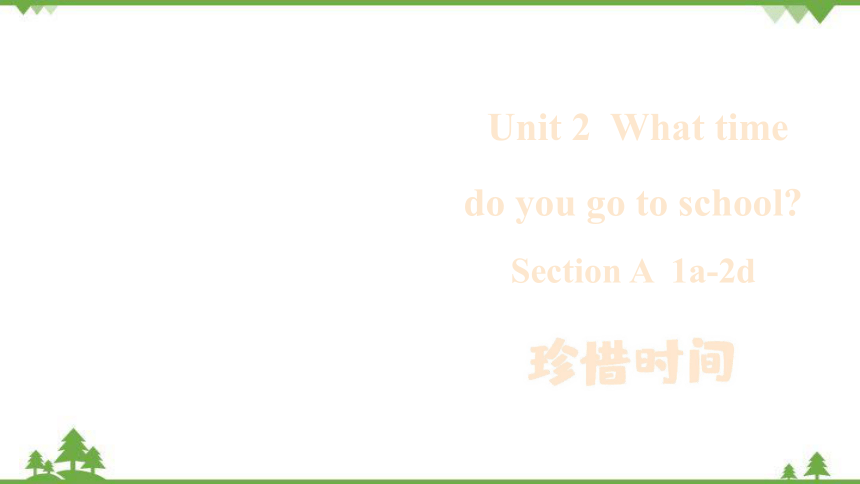 | |
| 格式 | ppt | ||
| 文件大小 | 4.8MB | ||
| 资源类型 | 教案 | ||
| 版本资源 | 人教新目标(Go for it)版 | ||
| 科目 | 英语 | ||
| 更新时间 | 2022-06-16 09:06:06 | ||
图片预览

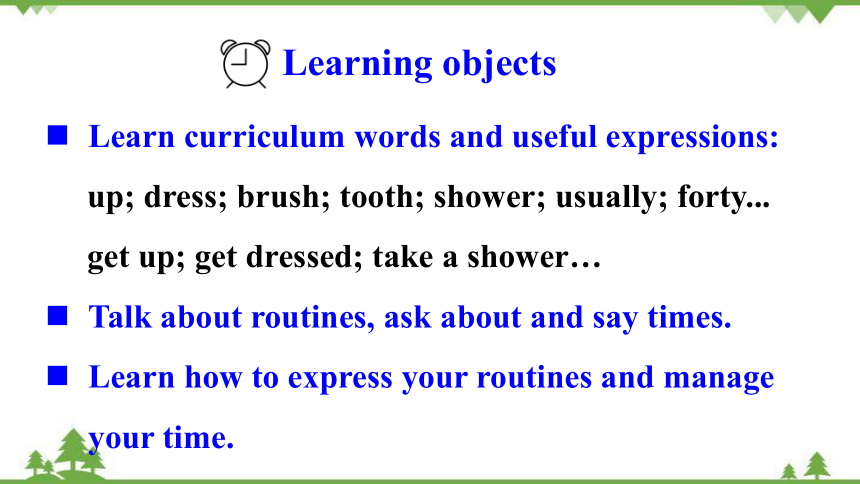
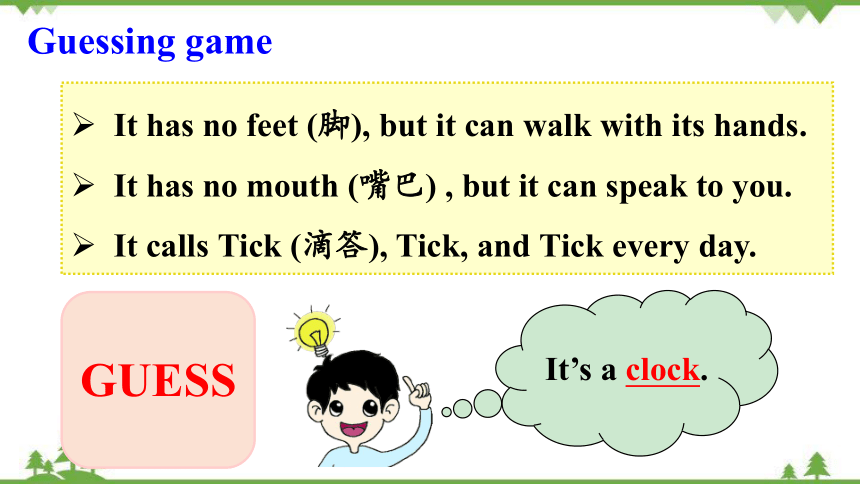

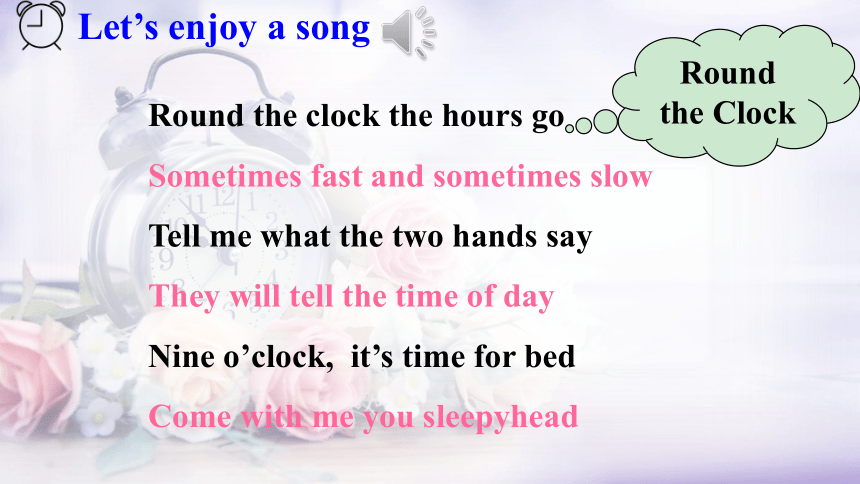
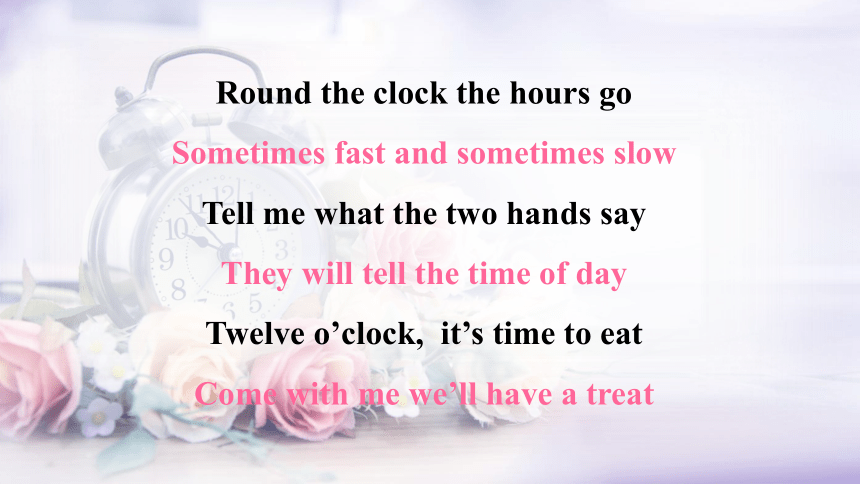
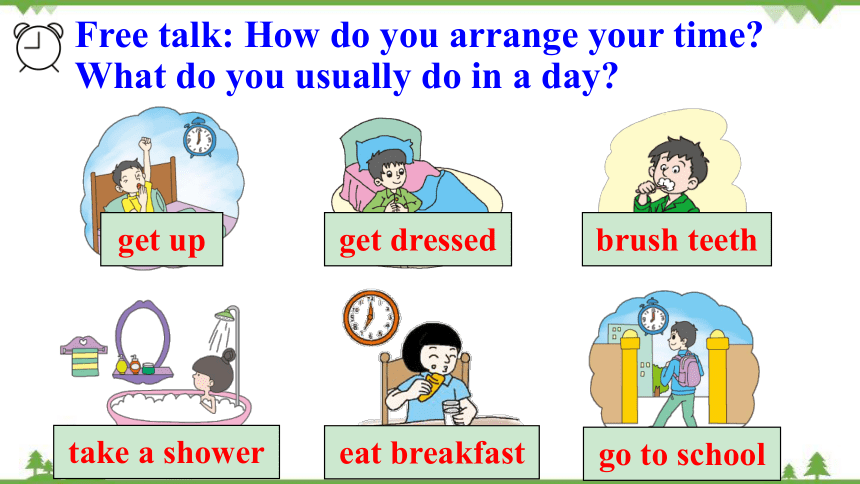
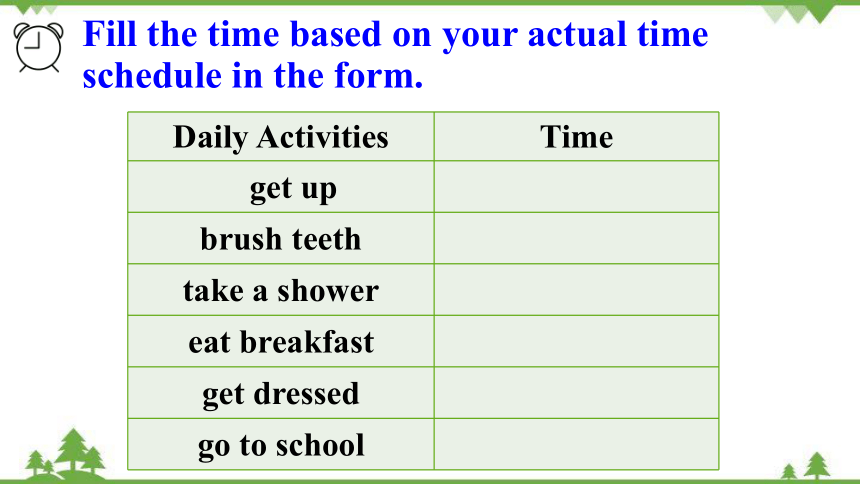
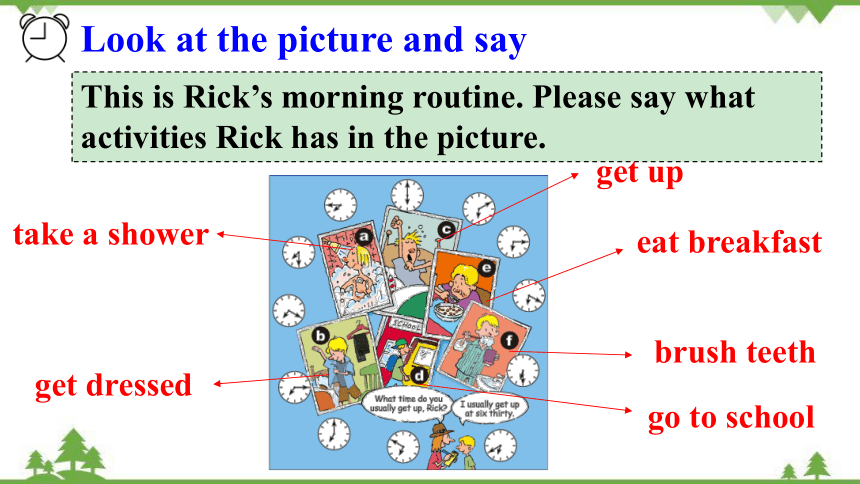
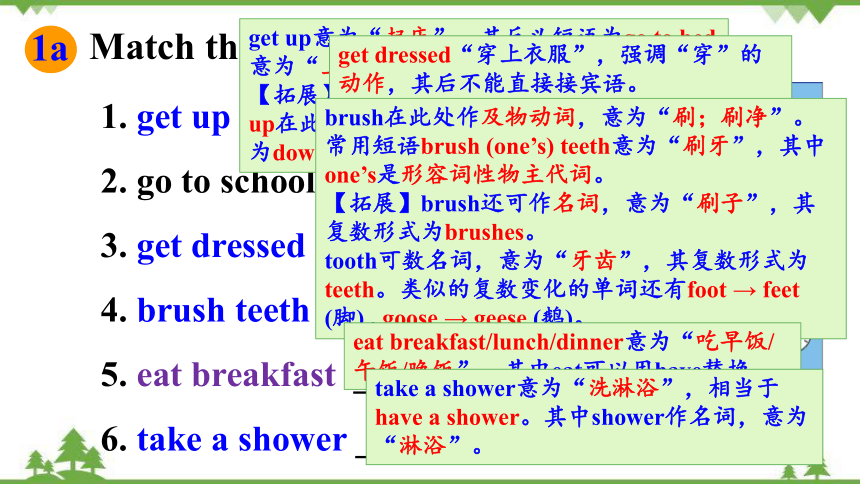
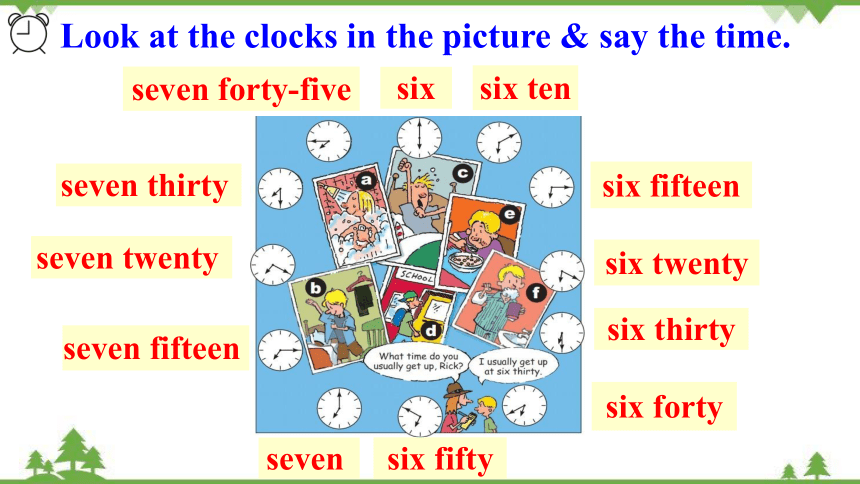
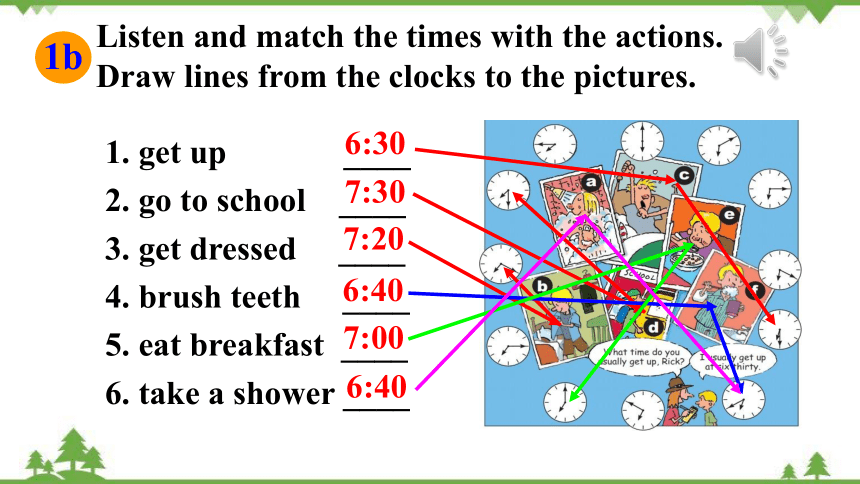
文档简介
(共36张PPT)
Unit 2 What time
do you go to school
Section A 1a-2d
Learning objects
Learn curriculum words and useful expressions:
up; dress; brush; tooth; shower; usually; forty...
get up; get dressed; take a shower…
Talk about routines, ask about and say times.
Learn how to express your routines and manage your time.
It has no feet (脚), but it can walk with its hands.
It has no mouth (嘴巴) , but it can speak to you.
It calls Tick (滴答), Tick, and Tick every day.
Guessing game
GUESS
It’s a clock.
—What time is it —It’s…
1
eight o’clock
2
3
4
5
6
eleven fifteen
seven fifteen
three thirty
six thirty
twelve o’clock
Try to speak out the time as quickly as possible.
Let’s see who’s quick and accurate (准确).
Clock game
Round the clock the hours go
Sometimes fast and sometimes slow
Tell me what the two hands say
They will tell the time of day
Nine o’clock, it’s time for bed
Come with me you sleepyhead
Let’s enjoy a song
Round the Clock
Round the clock the hours go
Sometimes fast and sometimes slow
Tell me what the two hands say
They will tell the time of day
Twelve o’clock, it’s time to eat
Come with me we’ll have a treat
Free talk: How do you arrange your time What do you usually do in a day
get up
get dressed
brush teeth
take a shower
go to school
eat breakfast
Fill the time based on your actual time schedule in the form.
Daily Activities Time
get up
brush teeth
take a shower
eat breakfast
get dressed
go to school
This is Rick’s morning routine. Please say what activities Rick has in the picture.
Look at the picture and say
take a shower
get up
eat breakfast
brush teeth
go to school
get dressed
1a
Match the activities with the pictures.
1. get up ____
2. go to school ____
3. get dressed ____
4. brush teeth ____
5. eat breakfast ____
6. take a shower ____
c
d
b
f
e
a
get up意为“起床”,其反义短语为go to bed,意为“上床睡觉”。
【拓展】get up还可意为“站起;起身”。
up在此处作副词,意为“向上”,其反义词为down,意为“向下”。
get dressed“穿上衣服”,强调“穿”的动作,其后不能直接接宾语。
be dressed in“穿着”强调“穿”的状态,其后可接表示衣服或颜色的名词(短语)。
dress在此处作动词,意为“穿衣服”。dress sb.意为“给某人穿衣服”。
【拓展】dress还可作可数名词,意为“连衣裙”,其复数形式为dresses。
brush在此处作及物动词,意为“刷;刷净”。常用短语brush (one’s) teeth意为“刷牙”,其中one’s是形容词性物主代词。
【拓展】brush还可作名词,意为“刷子”,其复数形式为brushes。
tooth可数名词,意为“牙齿”,其复数形式为teeth。类似的复数变化的单词还有foot → feet (脚) , goose → geese (鹅)。
eat breakfast/lunch/dinner意为“吃早饭/午饭/晚饭”。其中eat可以用have替换。
take a shower意为“洗淋浴”,相当于have a shower。其中shower作名词,意为“淋浴”。
six
six ten
six forty
six fifteen
six twenty
six thirty
six fifty
seven
seven fifteen
seven twenty
seven thirty
seven forty-five
Look at the clocks in the picture & say the time.
1b
Listen and match the times with the actions.
Draw lines from the clocks to the pictures.
1. get up ____
2. go to school ____
3. get dressed ____
4. brush teeth ____
5. eat breakfast ____
6. take a shower ____
6:30
7:30
7:20
6:40
7:00
6:40
Time Daily Activities
6:30 get up
6:40
brush his teeth & take a shower
7:00
eat breakfast
7:20
get dressed
7:30
go to school
Listen again and fill the information in Rick’s schedule.
My name is Rick. I’m thirteen. I’m a student. I get up at six thirty every day. Then I brush my teeth and take a shower at six forty. I eat breakfast at seven. I usually get dressed at seven twenty. Then I go to school at seven thirty.
假如你是 Rick,根据 1a 的图片和时间说出你一天的基本活动。可以适当增加内容。
Tapescripts
Interviewer:
Rick:
Interviewer:
Rick:
What time do you usually get up, Rick
Um, I usually get up at six thirty.
And what time do you brush your teeth and take a shower
I brush my teeth and take a shower at six forty.
Interviewer:
Rick:
Interviewer:
Rick:
Interviewer:
Rick:
Interviewer:
Hmm. What time do you eat breakfast
Seven o’clock.
And what time do you usually get dressed
I usually get dressed at seven twenty.
And my last question. What time do you go to school
I usually go to school at seven thirty.
Thank you.
1c
Student A is the interviewer. Student B is Rick. Ask and answer questions about Rick’s day.
A: What time do you usually take a
shower, Rick
B: I usually take a shower at six forty.
what time意为“几点”,用来对具体的时间点提问。
usually频度副词,意为“通常地;一般地”,在句中作状语;通常位于实义动词之前,be动词、助动词或情态动词之后。
at介词,常用于“钟点、时刻”前,表示“在具体的某一时刻”。
I usually get up at six thirty.
For example
What time do you usually get up, Rick
I usually _______ at ______.
What time do you usually ______, Rick
A: What time does he/she… B: He/She…
eat breakfast
take a shower
go to school
7:10
6:45
7:30
do homework
A: What time does he/she… B: He/She…
go to bed
9:40
6:15
What’s the relationship
among them
How many brothers and
sisters does Jim have
What are they doing in
this picture
Look at the picture and guess
2a
Listen to the conversation and complete the sentences.
Jim has ____ brothers and ____ sisters. Jim’s family has ________ shower.
two
two
only one
l) Does Jim have a big family Why do you think so
2) Is it difficult for Jim’s family to take showers
Why or why not
3) What does the word “schedule” mean
Listen again and answer the questions
Yes, he does. Because he has two brothers and two sisters.
No, it isn’t. Because his family has a shower schedule.
It means “时间表、计划表”.
Listen again and rank Jim’s family’ names in the shower schedule.
________
________
________
________
________
Bob
Mary
Jack
Jim
Anna
①
②
③
④
⑤
2b
Listen again. Complete the shower schedule for Jim’s family.
Name Bob Mary Jack Jim Anna
Time 5:30
5:50
6:15
6:30
6:45
Tapescripts
Interviewer:
Jim: Interviewer:
Jim:
Interviewer:
Jim:
You have a big family, don’t you, Jim
Yes, I have two brothers and two sisters.
Wow! How many showers do you have
We only have one shower.
Is that difficult
No, because we have a shower schedule. My brother Bob takes a shower first
at five thirty.
工作计划;日程安排
Wow! That’s early!
Yeah. Then my sister Mary takes a shower at five fifty. Next my brother Jack takes a shower at six fifteen. I take a shower at six thirty, my sister Anna at six forty-five…
Interviewer:
Jim:
2c
Now talk about yourself.
What time do you usually get up
I always get up at five fifty.
Wow! I never get up so early.
never频度副词,意为“从不;绝不”,表示否定意义。常位于实义动词之前,be动词、助动词或情态动词之后。
early在此句中作副词,意为“早”,其反义词是late,意为“迟;晚”。
Now follow the example and talk with your partner about schedules.
What time do you usually...
I usually... at...
How about you
...
get up go to school get dressed
brush teeth eat breakfast take a shower
Before-reading: Let’s guess.
Look at the picture, this is my friend Scott.
Where is he and what
is he doing
And what is his job
Read the conversation in 2d, then answer the questions below.
Where does Scott work
Does he work at night
When is his radio show
He works at a radio station.
Yes, he does.
It’s from twelve o’clock at night to six o’clock in the morning.
No, he is never late for work.
Is he sometimes late for work
Read the conversation in 2d and fill in Scott’s schedule.
Time Daily Activities
8:30 p.m. get up
9:00 p.m.
go to work
10:20 p.m.
eat breakfast
11:00 p.m.
exercise
Interviewer: Scott has an interesting job. He works at a
radio station. Scott, what time is your radio
show
Scott: From twelve o’clock at night to six o’clock
in the morning.
Interviewer: What time do you usually get up
Scott: At eight thirty at night. Then I eat
breakfast at nine.
广播电台
job可数名词,意为“工作;职业”。【拓展】“Good job!”常用于口语中,意为“干得好!”,用来称赞对方。
work在此句中作不及物动词,意为“工作”。其名词形式为worker,意为“工人;工作者”。
from... to... 意为“从……到……”,可用来表述时间、地点、数目等的范围。
at night固定短语,意为“在夜晚”。其中night作名词,意为“晚上;夜晚”,一般指从天黑到天明之前的这段时间。其对应词为day,意为“白天”。
o’clock副词,意为“(表示整点)……点钟”,用于整点之后,并且在许多情况下可以省略。
2d
Role-play the conversation.
interesting形容词,意为“有趣的”,常用来说明事物的特征,在句中作定语或表语。
Interviewer: That’s funny time for breakfast!
Scott: Yeah. After that, I usually exercise at about
ten twenty.
Interviewer: When do you go to work
Scott: At eleven o’clock, so I’m never late for work.
funny形容词,意为“奇怪的;滑稽好笑的”,在句中既可作定语,也可作表语。
time for... 意为“做……的时间”。
【拓展】含time的常见句式如下:
(1) It’s time for sth.意为“到做某事的时间了”。
(2) It’s time (for sb.) to do sth.意为“到(某人)做某事的时间了”。
exercise在此句中作不及物动词,意为“锻炼”。
【拓展】(1) exercise还可作不可数名词,意为“锻炼”。
(2) exercise还可作可数名词,意为“练习;习题;一套动作”。
about在此句中作副词,意为“大约”,表示约数,通常位于数字前。
so在此句中作连词,意为“因此;所以”,表示因果关系。
be late for意为“……迟到”。
Fill in the blanks according to the conversation.
An interviewer is interviewing Scott about his job. Scott works at a ___________. It is an interesting job. He usually_________ at 8:30 at night. Then he _____________ at 9:00. After that he usually _________ at about 10:20. At 11:00, he _____________.
gets up
radio station
exercises
goes to work
has breakfast
Key words: up; dress; brush; tooth; shower
usually; forty; never; early; exercise; fifty; job;
work; station; o’clock; night; funny
Phrases: get up; get dressed; take a shower; radio station; brush teeth; go to school; eat breakfast
Sentences: —What time do you usually get up
—I always get up at five fifty.
Summary
Unit 2 What time
do you go to school
Section A 1a-2d
Learning objects
Learn curriculum words and useful expressions:
up; dress; brush; tooth; shower; usually; forty...
get up; get dressed; take a shower…
Talk about routines, ask about and say times.
Learn how to express your routines and manage your time.
It has no feet (脚), but it can walk with its hands.
It has no mouth (嘴巴) , but it can speak to you.
It calls Tick (滴答), Tick, and Tick every day.
Guessing game
GUESS
It’s a clock.
—What time is it —It’s…
1
eight o’clock
2
3
4
5
6
eleven fifteen
seven fifteen
three thirty
six thirty
twelve o’clock
Try to speak out the time as quickly as possible.
Let’s see who’s quick and accurate (准确).
Clock game
Round the clock the hours go
Sometimes fast and sometimes slow
Tell me what the two hands say
They will tell the time of day
Nine o’clock, it’s time for bed
Come with me you sleepyhead
Let’s enjoy a song
Round the Clock
Round the clock the hours go
Sometimes fast and sometimes slow
Tell me what the two hands say
They will tell the time of day
Twelve o’clock, it’s time to eat
Come with me we’ll have a treat
Free talk: How do you arrange your time What do you usually do in a day
get up
get dressed
brush teeth
take a shower
go to school
eat breakfast
Fill the time based on your actual time schedule in the form.
Daily Activities Time
get up
brush teeth
take a shower
eat breakfast
get dressed
go to school
This is Rick’s morning routine. Please say what activities Rick has in the picture.
Look at the picture and say
take a shower
get up
eat breakfast
brush teeth
go to school
get dressed
1a
Match the activities with the pictures.
1. get up ____
2. go to school ____
3. get dressed ____
4. brush teeth ____
5. eat breakfast ____
6. take a shower ____
c
d
b
f
e
a
get up意为“起床”,其反义短语为go to bed,意为“上床睡觉”。
【拓展】get up还可意为“站起;起身”。
up在此处作副词,意为“向上”,其反义词为down,意为“向下”。
get dressed“穿上衣服”,强调“穿”的动作,其后不能直接接宾语。
be dressed in“穿着”强调“穿”的状态,其后可接表示衣服或颜色的名词(短语)。
dress在此处作动词,意为“穿衣服”。dress sb.意为“给某人穿衣服”。
【拓展】dress还可作可数名词,意为“连衣裙”,其复数形式为dresses。
brush在此处作及物动词,意为“刷;刷净”。常用短语brush (one’s) teeth意为“刷牙”,其中one’s是形容词性物主代词。
【拓展】brush还可作名词,意为“刷子”,其复数形式为brushes。
tooth可数名词,意为“牙齿”,其复数形式为teeth。类似的复数变化的单词还有foot → feet (脚) , goose → geese (鹅)。
eat breakfast/lunch/dinner意为“吃早饭/午饭/晚饭”。其中eat可以用have替换。
take a shower意为“洗淋浴”,相当于have a shower。其中shower作名词,意为“淋浴”。
six
six ten
six forty
six fifteen
six twenty
six thirty
six fifty
seven
seven fifteen
seven twenty
seven thirty
seven forty-five
Look at the clocks in the picture & say the time.
1b
Listen and match the times with the actions.
Draw lines from the clocks to the pictures.
1. get up ____
2. go to school ____
3. get dressed ____
4. brush teeth ____
5. eat breakfast ____
6. take a shower ____
6:30
7:30
7:20
6:40
7:00
6:40
Time Daily Activities
6:30 get up
6:40
brush his teeth & take a shower
7:00
eat breakfast
7:20
get dressed
7:30
go to school
Listen again and fill the information in Rick’s schedule.
My name is Rick. I’m thirteen. I’m a student. I get up at six thirty every day. Then I brush my teeth and take a shower at six forty. I eat breakfast at seven. I usually get dressed at seven twenty. Then I go to school at seven thirty.
假如你是 Rick,根据 1a 的图片和时间说出你一天的基本活动。可以适当增加内容。
Tapescripts
Interviewer:
Rick:
Interviewer:
Rick:
What time do you usually get up, Rick
Um, I usually get up at six thirty.
And what time do you brush your teeth and take a shower
I brush my teeth and take a shower at six forty.
Interviewer:
Rick:
Interviewer:
Rick:
Interviewer:
Rick:
Interviewer:
Hmm. What time do you eat breakfast
Seven o’clock.
And what time do you usually get dressed
I usually get dressed at seven twenty.
And my last question. What time do you go to school
I usually go to school at seven thirty.
Thank you.
1c
Student A is the interviewer. Student B is Rick. Ask and answer questions about Rick’s day.
A: What time do you usually take a
shower, Rick
B: I usually take a shower at six forty.
what time意为“几点”,用来对具体的时间点提问。
usually频度副词,意为“通常地;一般地”,在句中作状语;通常位于实义动词之前,be动词、助动词或情态动词之后。
at介词,常用于“钟点、时刻”前,表示“在具体的某一时刻”。
I usually get up at six thirty.
For example
What time do you usually get up, Rick
I usually _______ at ______.
What time do you usually ______, Rick
A: What time does he/she… B: He/She…
eat breakfast
take a shower
go to school
7:10
6:45
7:30
do homework
A: What time does he/she… B: He/She…
go to bed
9:40
6:15
What’s the relationship
among them
How many brothers and
sisters does Jim have
What are they doing in
this picture
Look at the picture and guess
2a
Listen to the conversation and complete the sentences.
Jim has ____ brothers and ____ sisters. Jim’s family has ________ shower.
two
two
only one
l) Does Jim have a big family Why do you think so
2) Is it difficult for Jim’s family to take showers
Why or why not
3) What does the word “schedule” mean
Listen again and answer the questions
Yes, he does. Because he has two brothers and two sisters.
No, it isn’t. Because his family has a shower schedule.
It means “时间表、计划表”.
Listen again and rank Jim’s family’ names in the shower schedule.
________
________
________
________
________
Bob
Mary
Jack
Jim
Anna
①
②
③
④
⑤
2b
Listen again. Complete the shower schedule for Jim’s family.
Name Bob Mary Jack Jim Anna
Time 5:30
5:50
6:15
6:30
6:45
Tapescripts
Interviewer:
Jim: Interviewer:
Jim:
Interviewer:
Jim:
You have a big family, don’t you, Jim
Yes, I have two brothers and two sisters.
Wow! How many showers do you have
We only have one shower.
Is that difficult
No, because we have a shower schedule. My brother Bob takes a shower first
at five thirty.
工作计划;日程安排
Wow! That’s early!
Yeah. Then my sister Mary takes a shower at five fifty. Next my brother Jack takes a shower at six fifteen. I take a shower at six thirty, my sister Anna at six forty-five…
Interviewer:
Jim:
2c
Now talk about yourself.
What time do you usually get up
I always get up at five fifty.
Wow! I never get up so early.
never频度副词,意为“从不;绝不”,表示否定意义。常位于实义动词之前,be动词、助动词或情态动词之后。
early在此句中作副词,意为“早”,其反义词是late,意为“迟;晚”。
Now follow the example and talk with your partner about schedules.
What time do you usually...
I usually... at...
How about you
...
get up go to school get dressed
brush teeth eat breakfast take a shower
Before-reading: Let’s guess.
Look at the picture, this is my friend Scott.
Where is he and what
is he doing
And what is his job
Read the conversation in 2d, then answer the questions below.
Where does Scott work
Does he work at night
When is his radio show
He works at a radio station.
Yes, he does.
It’s from twelve o’clock at night to six o’clock in the morning.
No, he is never late for work.
Is he sometimes late for work
Read the conversation in 2d and fill in Scott’s schedule.
Time Daily Activities
8:30 p.m. get up
9:00 p.m.
go to work
10:20 p.m.
eat breakfast
11:00 p.m.
exercise
Interviewer: Scott has an interesting job. He works at a
radio station. Scott, what time is your radio
show
Scott: From twelve o’clock at night to six o’clock
in the morning.
Interviewer: What time do you usually get up
Scott: At eight thirty at night. Then I eat
breakfast at nine.
广播电台
job可数名词,意为“工作;职业”。【拓展】“Good job!”常用于口语中,意为“干得好!”,用来称赞对方。
work在此句中作不及物动词,意为“工作”。其名词形式为worker,意为“工人;工作者”。
from... to... 意为“从……到……”,可用来表述时间、地点、数目等的范围。
at night固定短语,意为“在夜晚”。其中night作名词,意为“晚上;夜晚”,一般指从天黑到天明之前的这段时间。其对应词为day,意为“白天”。
o’clock副词,意为“(表示整点)……点钟”,用于整点之后,并且在许多情况下可以省略。
2d
Role-play the conversation.
interesting形容词,意为“有趣的”,常用来说明事物的特征,在句中作定语或表语。
Interviewer: That’s funny time for breakfast!
Scott: Yeah. After that, I usually exercise at about
ten twenty.
Interviewer: When do you go to work
Scott: At eleven o’clock, so I’m never late for work.
funny形容词,意为“奇怪的;滑稽好笑的”,在句中既可作定语,也可作表语。
time for... 意为“做……的时间”。
【拓展】含time的常见句式如下:
(1) It’s time for sth.意为“到做某事的时间了”。
(2) It’s time (for sb.) to do sth.意为“到(某人)做某事的时间了”。
exercise在此句中作不及物动词,意为“锻炼”。
【拓展】(1) exercise还可作不可数名词,意为“锻炼”。
(2) exercise还可作可数名词,意为“练习;习题;一套动作”。
about在此句中作副词,意为“大约”,表示约数,通常位于数字前。
so在此句中作连词,意为“因此;所以”,表示因果关系。
be late for意为“……迟到”。
Fill in the blanks according to the conversation.
An interviewer is interviewing Scott about his job. Scott works at a ___________. It is an interesting job. He usually_________ at 8:30 at night. Then he _____________ at 9:00. After that he usually _________ at about 10:20. At 11:00, he _____________.
gets up
radio station
exercises
goes to work
has breakfast
Key words: up; dress; brush; tooth; shower
usually; forty; never; early; exercise; fifty; job;
work; station; o’clock; night; funny
Phrases: get up; get dressed; take a shower; radio station; brush teeth; go to school; eat breakfast
Sentences: —What time do you usually get up
—I always get up at five fifty.
Summary
同课章节目录
- Unit 1 Can you play the guitar?
- Section A
- Section B
- Unit 2 What time do you go to school?
- Section A
- Section B
- Unit 3 How do you get to school?
- Section A
- Section B
- Unit 4 Don't eat in class.
- Section A
- Section B
- Unit 5 Why do you like pandas?
- Section A
- Section B
- Unit 6 I'm watching TV.
- Section A
- Section B
- Review of Units 1-6
- Unit 7 It's raining!
- Section A
- Section B
- Unit 8 Is there a post office near here?
- Section A
- Section B
- Unit 9 What does he look like?
- Section A
- Section B
- Unit 10 I'd like some noodles.
- Section A
- Section B
- Unit 11 How was your school trip?
- Section A
- Section B
- Unit 12 What did you do last weekend?
- Section A
- Section B
